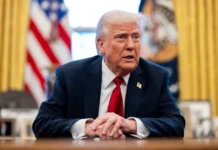A few months ago, due to the repeated haplessness of U.S. President Donald Trump in the face of major Iranian provocations, I wrote a scathing article titled “No Principles, No Dignity, No Power, No Deterrence,” in which I argued that apparently the comprehension that principles, dignity and power translate into deterrence, and prevent escalation into a more costly war, was beyond Trump’s understanding as a great hotelier. Today, I must salute him; he has clearly undergone a major change.
Today, he seems to understand that leadership is not deal making, and particularly not deals with evil. Finally, he understands that the art of the deal belongs to the commercial world, and as a leader of the one superpower responsible for the free world’s security, he must stand on principles and yes, even on dignity and the readiness to use force when absolutely necessary.
In the operation to take out Iranian general Qassem Soleimani he reversed all the elements of weakness that characterized his prior conduct. This time, the national security team he commanded showed intelligence, technological and political superiority, and surprised the Iranian adversary. All this combines into deterrence. The scared and deterred Iranian regime was extremely careful not to take American lives in their response, that merits a global innovation prize for waging war without casualties (except for smashed plastic crockery). Just as the Iranians did not dare to make good their threats, so the Pyongyang Rocketman did not dare play Santa with his promised Christmas present—he, too, feared a “disproportionate response” by Trump.
Those guided by Trump’s previous track record view his dramatic strike on Soleimani as yet another sign of capricious behavior. He simply woke up on the wrong side of the bed, they scoff. He needed to kick-start his election campaign, and so on. They refuse to credit him with undergoing a profound change.
Trump, as is well known, is ready to quit both Iraq and Afghanistan, but not as a defeated power as Soleimani wanted, and as the Taliban seek. Ever since the crisis, we do not hear Trump talking about a deal with an Iran that attacked the U.S. embassy in Baghdad and was a hair’s breadth away from capturing it and taking the embassy staff hostage or worse. Instead, Trump sends his encouragement to the protesters seeking the downfall of the dictatorial regime.
“To the brave, long-suffering people of Iran: I’ve stood with you since the beginning of my Presidency, and my Administration will continue to stand with you. We are following your protests closely, and are inspired by your courage,” he wrote.
He gets it: Confrontation with evil is unavoidable because evil pursues you even if you try to avoid it. The choice is between standing up or being humiliatingly defeated, and President Trump rejects defeat.
In my previous, critical article, I questioned Trump’s gesture of restoring the bust of Churchill, which his predecessor Barack Obama had banished from the Oval Office because he believed in peace through appeasement. At the time, Trump’s gesture seemed to me a hollow one, since his actual policy was the opposite of Churchillian. However, in the way he handled the current crisis vs. Iran, he intuitively began to display Churchillian principles. The deterrence that he achieved extends beyond Iran to other rogue leaders in the Middle East and globally. Whoever had the courage to take out Soleimani is apparently willing to stand up to other bullies. Trump set red lines and, as opposed to his predecessor, stuck to them.
Trump’s success in the confrontation with Iran is a learning experience for his presidency and America’s adversaries and friends. It could mark Trump’s personal metamorphosis from celebrating a deal where there is no deal to be made, to growing into the role of fighting evil, which even in victory is a heartbreaking and tragic role for a president and leader of the free world.
Yigal Carmon is the president and founder of MEMRI.


























